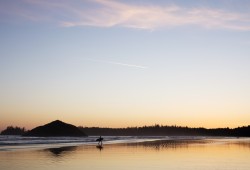When B.C.’s proof of vaccination requirement expired on April 8, it was the last major COVID-19 measure removed by the province.
Tla-o-qui-aht First Nation has followed suit by easing its COVID-19 restrictions, and after more than two years, the nation’s Tribal Administrator Jim Chisholm said “life is getting back to normal.”
Face mask requirements have been relaxed, restrictions on the number of people at indoor and outdoor gatherings have been eased, and there is no longer a check-stop at the entrance of Ty-Histanis to monitor people coming and going from the community.
This comes as a “relief” to many community members, Chisholm said.
“We had a lot of our elders and a lot of our people that hadn't seen their grandkids in a year,” Chisholm said. “Now, they can get back together with [their] family.”
While the community is “joyful” overall, Chisholm said the tribal administration and emergency management continues to closely monitor COVID-19 case counts.
The nation remains concerned anytime one of its members gets COVID-19, he said.
“We still do get the odd [case], but obviously not as bad as we had it before,” Chisholm added.
The nation is located near Tofino, a popular tourist destination on Vancouver Island that is gearing up for a busy summer season, following a pent-up demand for travel with the easing of these restrictions.
Tourism Tofino Executive Director Nancy Cameron said hotel occupancy is expected to be 90 to 95 per cent for July and August.
“After a challenging two years for many tourism operators, we are projecting that July and August visitation will be close to pre-pandemic levels,” she said. “We are thrilled to also see the gradual return of international visitors, although not yet at 2019 levels.”
With the return of tourists visiting the area, Tofino-Long Beach Chamber of Commerce President Laura McDonald said businesses are “extremely concerned about staffing shortages and the impact on their operations.”
While a variety of factors are at play, McDonald said the lack of housing is one of the leading causes of the staffing shortages.
The District of Tofino finished construction on a 14-unit affordable housing project earlier this year and another is expected to be complete in 2023, said McDonald.
“While these projects are encouraging, they won’t on their own alleviate Tofino’s housing issues,” she said. “We still require new residential housing developments to be built in the district. The reality of staffing shortages is that businesses have to adjust and sometimes curtail services, and we are seeing this happen.”
Lewis and Cathy George have been operating the House of Himwitsa, a First Nations art gallery and lodge, since 1991.
While the lodge’s occupancy rate has returned to pre-pandemic levels and is already 95 per cent full for the months of July and August, Cathy said they’re keeping COVID-19 safety protocols in place.
Staff are only permitted to enter guest rooms after they’ve managed to disinfect and clean for the next visitors, she said.
“We’re having a hard time with staff,” Cathy said. “I don’t want to put any pressure on them above and beyond what’s already going on.”
Because of the specialized nature of the art gallery, Cathy said it’s been challenging to retain staff. The business is operating with four fewer employees than normally required.
“Everybody here [in Tofino] is struggling for staff,” she said.
Although Cathy said she would like to hire more people from Ahousaht First Nation, it’s not economically feasible for most to charter a boat to and from work every day.
“If there was better transportation from Ahousaht, we would probably get a few more people working outside of the reserve,” she said.
With more people turning to online shopping since the start of the pandemic, Lewis said the House of Himwitsa is creating an website store for their gallery.
“It’s going to make a huge difference,” he said.
Visitors are not required to wear masks in the gallery, but Cathy said many put them on before entering the business.
For Cathy, it’s a show of “respect.”
“I think it’s important,” she said. “Especially in small communities like this where things can spread so easily. “
Despite continuing to wear her mask when the art gallery gets busy and trying to protect family members with asthma, Cathy said she “looks forward” to welcoming international visitors back to her store.
“I really enjoy talking to people from all over the world,” she said. “They just love our culture.”


